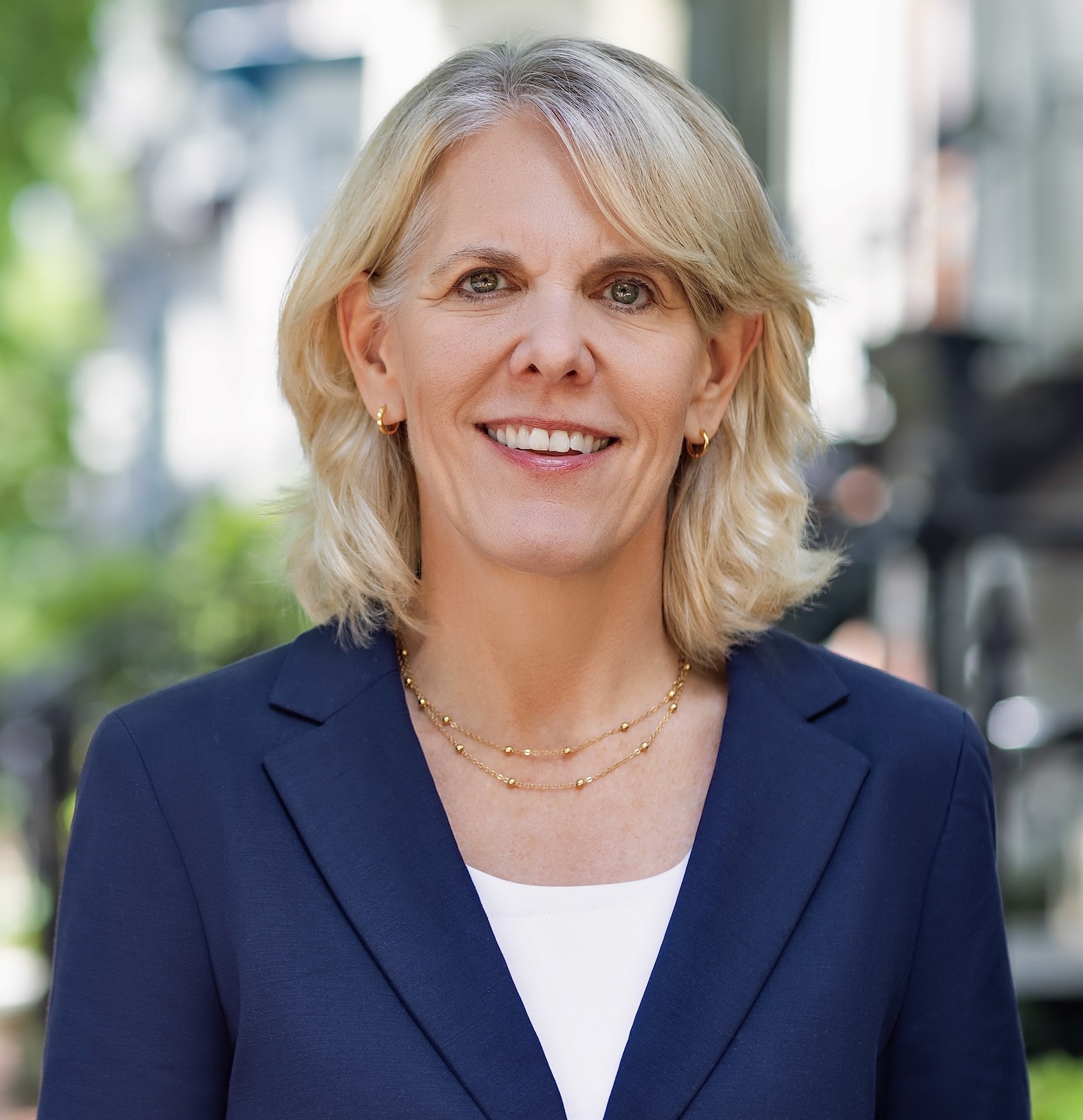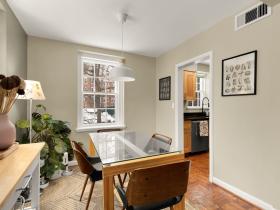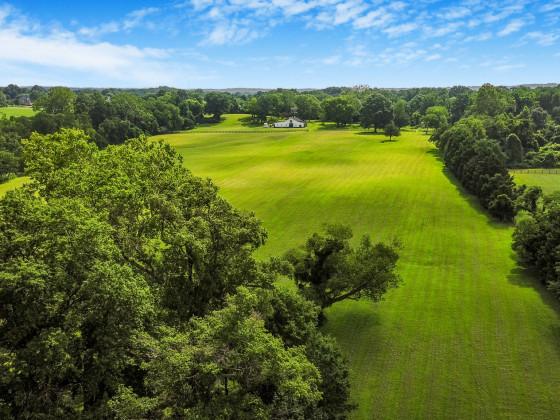 The Future of DC Housing Discussed at Smart Growth Forum
The Future of DC Housing Discussed at Smart Growth Forum
✉️ Want to forward this article? Click here.
In a presentation at the office of the National Capital Planning Commission last night, Director of the DC Office of Planning Harriet Tregoning painted a picture of what might happen on the city’s housing scene in the coming years. The purpose of the forum, titled Urban Hipsters and Long-time Residents Unite!, was to reconcile the interests of DC’s new urban population with its longer-term residents in an effort to preserve mixed-income neighborhoods as the city grows.
While much of the presentation centered around smart growth and transportation options, when it came to housing, Tregoning said it will be necessary to create more accessory dwelling units, or properties carved from larger homes into condos, English-basement apartments, or alley dwellings in the coming years. The reason behind this is that 50 percent of households in the city are single-person dwellings, but DC’s housing inventory doesn’t fit current demographics.
“We have a housing stock much of which was constructed a hundred years ago,” Tregoning said. “So we have a bit of a mismatch between the size of that housing stock and the population that looks like it will be our future.”
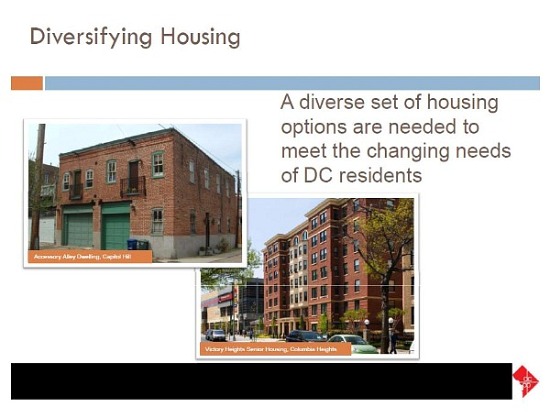
From Harriet Tregoning’s presentation. Courtesy of The Coalition for Smarter Growth.
Tregoning also emphasized that affordable housing would be a top development priority, noting that one of the lessons learned from the development in Columbia Heights is the need to make sure that, going forward, there is affordable housing in every city neighborhood.
“We’re looking forward to a rebound in the economy that would generate for us what we hope would be on average 170 units a year targeted to households earning between $39,000 and $82,000, depending on family size,” Tregoning said during her presentation.
While she referenced affordable housing developments all over the city, Tregoning singled out neighborhoods along the Anacostia River as a target for these developments.
“We have a lot of development that we’re planning to do along the Anacostia, and that’s another area where that land is publicly held, and so those are areas where you should expect and we certainly will demand very high levels of affordability, much more than the 8 to 12 percent than we’re getting from inclusionary zoning.”
One potential roadblock to the District’s development ambitions, however, is transportation. Developments in an area not served by public transit are still subject to parking-space minimums.
“One of the biggest expenses associated with building affordable housing, or housing of any kind, is the parking that’s associated with it,” Tregoning explained. “And it’s really common all across the country, that automatically, reflexively, parking is included as part of the cost of the housing.”
Hand-in-hand with plans for housing is the 37-mile streetcar project, which, if fully realized, will link remote areas not near Metro stations to other parts of the city.
“For the last 18 months, we’ve been acquiring land along the proposed streetcar routes, and we’ve been declining to dispose of land that we already own because we know that we’ll be able to guarantee affordable housing near transit if we own the land,” Tregoning said. “So having significant land ownership in public hands is a reason for us to route the streetcar a particular way.”
The question of Tregoning’s continued employment by the incoming Vince Gray administration was not addressed last night. However, Michael Neibauer of the Washington Business Journal recently predicted that she’ll make the transition, and Tom Bridge of We Love DC has been told by sources that she’ll stay on. During her presentation, she certainly didn’t sound like somebody who was about to leave office.
When asked whether there might be a different philosophy guiding growth and development during the next administration, she responded that the city plans to focus on developing an economy that’s more oriented toward supporting small businesses than real estate development.
“In the last 15 or 20 years in this city, economic development was real estate development. We believed the myth about our own town that we were a government town, that all the jobs came from government, and we didn’t really have to develop any kind of an economy,” she said.
But with a constant influx of young and highly educated people, Tregoning said the District has a creative and ambitious population that won’t necessarily depend on government largesse.
“I think that one of the big changes is a lot of focus on jobs, on workforce development, on creating small businesses.” she said. “And real estate will still be important but it’s not going to be the only thing that we call economic development.”
This article originally published at https://dc.urbanturf.com/articles/blog/dcs_future_housing_development_discussed_at_smart_growth_forum/2768.
Most Popular... This Week • Last 30 Days • Ever
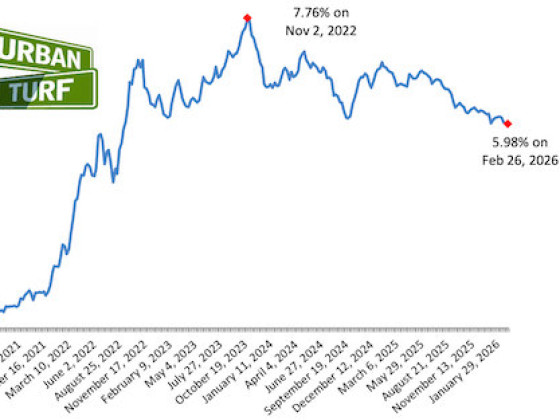
While it may seem like paying off a long-term mortgage early is a difficult task, it ... read »
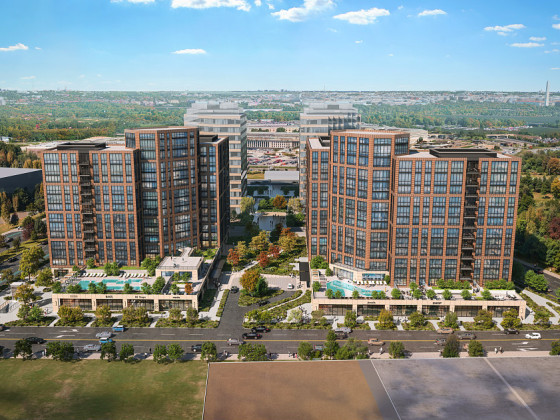
A new proposal is on the boards for the former home of the Transportation Security Ad... read »
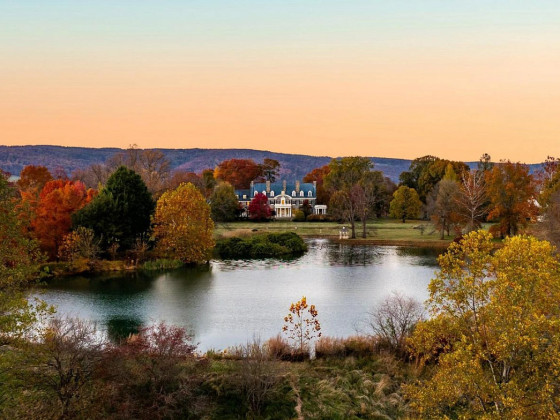
The property in Upperville known as Ayrshire Farm sold on Friday.... read »
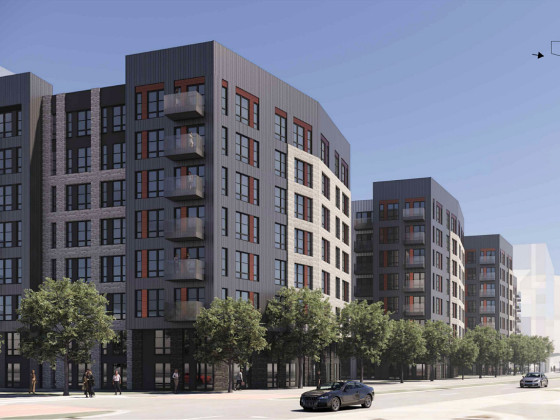
The developer is under contract to purchase Land Bay C-West, one of the last unbuilt ... read »
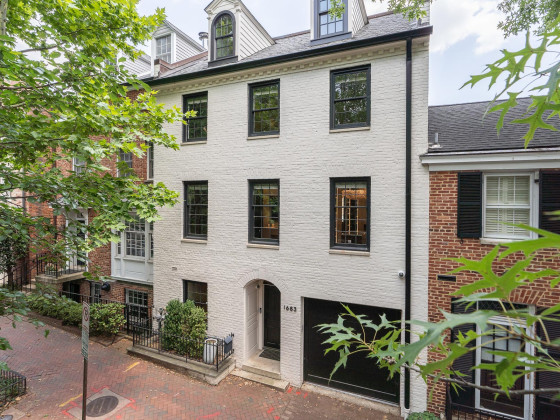
The classic Federal-style home recently underwent a dazzling, $2M renovation and boas... read »
- A Look at The Ways You Can Pay Off Your Mortgage Early
- 637 Apartments, 31,000 Square Feet Of Retail: The New Plans for Pentagon City TSA Site
- Sandy Lerner's 570-Acre Virginia Farm Sells For $19.8 Million
- The Last Piece of Potomac Yard: Mill Creek Residential Pitches 398-Unit Apartment Building
- A Pool, Elevator and Glass Roof: Luxuriously Renovated Georgetown Home Hits the Market
DC Real Estate Guides
Short guides to navigating the DC-area real estate market
We've collected all our helpful guides for buying, selling and renting in and around Washington, DC in one place. Start browsing below!
First-Timer Primers
Intro guides for first-time home buyers
Unique Spaces
Awesome and unusual real estate from across the DC Metro


